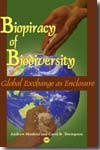Biopiracy of biodiversity
global exchange as enclosure
- ISBN: 9781592215034
- Editorial: Africa World Press, Inc.
- Fecha de la edición: 2007
- Lugar de la edición: New Jersey. Estados Unidos de Norteamérica
- Encuadernación: Rústica
- Medidas: 24 cm
- Nº Pág.: 325
- Idiomas: Inglés

Seeds have been exchanged among cultures for millennia, but suddenly the means of controlling seed trade and genetic transfers have been dramatically altered. This book offers the best means to understand how this issue affects you and every person, present and future, who deserves to know where their food comes from, and through whose hands. Gary Nabhan Director, Center for Sustainable Environments, USA Providing vital information to a cross-section of stakeholders, this book highlights the need for strategic policy alternatives to sustain biodiversity. I recommend it for reading by all those practitioners involved in economic development and food policy issues. Godwin Y. Mkamanga Director, SADC Plant Genetic Resources Centre, Zambia This book is a testimony of how biodiversity is integrated into the African culture of open hands exchanging seeds freely for the benefit of humanity. Although this practice is under threat, Africans continue to offer options for sharing nature s heritage. I recommend this book to all those struggling to grasp how different cultures can co-exist and interact to advance socio-economic development that is driven by our collective needs. Melaku Worede Founding Director, National Gene-Bank, Ethiopia Because seeds are a gift to each one of us, they are a gift to all. Ancient cultures increased this wealth by sharing cultivated seed, by giving it away. Today rich countries and corporations are taking seed and making it private property. They are also destroying seed by polluting fields with genetically modified organisms. Like pirates, they loot the wealth of others. The struggle for control of biodiversity is passionate: Corporate leaders assume they can make billions; many scientists aspire to manufacturing new species; the promise of new cures tantalizes. But no scientist, no patent lawyer, or economist can depict the whole picture. This book gives voice to those in Africa who know better and are willing to help.






